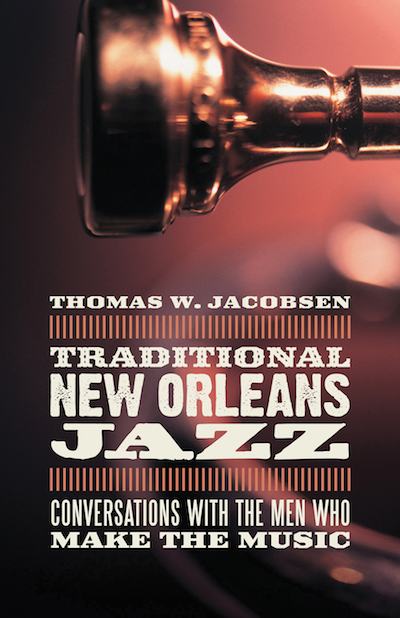More Trad Jazz...
| Besides the fact that I'm playing a lot more of it these days, one of the things that got me thinking more about the social and professional realities of traditional jazz was picking up a cheap, used copy of Thomas W. Jacobsen's new book "Traditional New Orleans Jazz: Conversations with the Men Who Make the Music" at my neighborhood bookstore (there are actually two independent bookstores in my neighborhood, we're blessed that way. As my late father used to say, "you're never really poor as long as you can afford a room near a good used bookstore"). Jacobsen's book is actually a series of interviews done over several years for "The Mississippi Rag," edited and contextualized in book form. It contains in-depth talks with many musicians who are well known within the city but less so outside of it, such as trumpeter Lionel Ferbos (at age 101, the city's oldest working jazz musician) clarinetist and Pete-Fountain-Heir-Apparent Tim Laughlin, and Bassist-Banjoist-Guitarist Don Vappie. There's also a seperate, discrete chapter entitled "Danny's Boys" outlining the mentorship of guitarist Danny Barker, who returned to the city in 1965 after a long and distinguished career in New York City to found the Fairview Baptist Church boys band, incubator of dozens of musicians of note on the current scene, from former Wynton Marsalis drummer Herlin Riley to lesser known but still important players like trumpeters Leroy Jones (Harry Connick Jr. big band) and Greg Davis (Dirty Dozen Brass Band), clarinetist Dr. Michael White (Liberty Brass Band) and trombonists Lucien Barbarin (Harry Connick Jr.) and Freddie Lonzo. Particularly significant and gratifying for me was the inclusion of an entire chapter on the late Vancouver saxophonist-clarinetist Brian Ogilvie. Brian was a marvelous player who, it seemed to me, never really got his full props before passing away, tragically and far too young, while on tour in Scotland with trumpeter Duke Heitiger's band in the summer of 2004. I first met Brian in 1976, when we were both in the Jazz and Commercial Music program at Vancouver Community college, and both studying with the late, great tenor saxophonist and Canadian jazz legend Fraser Macpherson. Even then Brian was a monster musician, swinging, with a beautiful sound on tenor and a conception very much in the Lester Young mould. The chapter is full of referrences to the Vancouver of the 1970s and it's jazz scene; Dave Todd's Lions Gate Jazz Band (where the young Brian first tested his chops), the Hot Jazz Club, his musical siblings (most of whom are still active on the Vancouver scene) and his first band, the West Side Feetwarmers. Reading it actually made me miss Vancouver, or maybe just the Vancouver of my youth. It makes no mention of the weather, which helps. Brian lived and worked in New Orleans for the last seven years of his life, and was highly regarded in the musical community here. He recorded a lot on other people's records (Banu Gibson, Connie Jones, Ralph Sutton, Randy Sandke, Duke Heiteger) but as far as I know did only one release as leader, the marvelous "For You" on the Arbors label, with John Sheridan, piano, Jeff Hamilton drums, and Phil Flanigan on bass. The book leaves out a number of people I consider to be significant players, particularly guys like Jamil Sherif, who put a lot of effort into pushing the music in clubs on a nightly basis. Jacobsen acknowleges this, and suggests there may be a follow-up volume. I'm finding my attitude towards "traditional jazz" has undergone a profound change since I moved to New Orleans. As a young man in Vancouver I regarded it as unmitigated corn, and turned a deaf ear to the many sources of musical wisdom that the young Brian Ogilvie was smart enough and open enough to investigate. In my first year or two here I regarded it as a subject for historical/academic study and had zero interest in playing it. Then, as I started to deconstruct and examine the music itself, it became obvious first that, from the perspective of rhythm-section playing, early New Orleans jazz is absolutely the source of what was to become "funk" music and all it's various offshoots. From a harmonic perspective, playing this stuff has made me much stronger in my harmonic approach to straight-ahead, modern things, because in the traditional form you simply cannot get away with just throwing a lot of notes out there and bullshitting your way through the changes. You must play plenty of chord tones and outline the harmony, and serious demands are made on your ear skills because, unlike modern jazz where the 'head' is usually stated in unison, in traditional jazz it is not only necessary to know the 'tune,' but also to come up with harmony lines, counter lines, and call-and-response figures, all spontaneously and in real time. The music is hard, brah. At the musician's clinic the other day, I ran into New Orleans legendary drum guru John Vidacovich. Johnny V. can and will hold forth on this and any other subject forever of course, but what he had to say on this occasion was particularly relevent. "It all starts there, brah," he said. "Everything in American music comes from those rhythms. That's the mother root, straight from Africa." |


Comments on "More Trad Jazz..."
-
 Mad-dam I am said ... (10:02 AM) :
Mad-dam I am said ... (10:02 AM) :
post a commentThanks for sharing this perspective of "trad." NO music. I admit I've also had some serious misconceptions, and such insights are really useful.